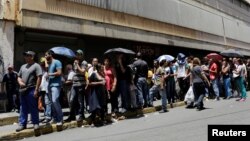Venezuela's socialist government has extended a two-day workweek for public sector employees for another two weeks because of a drought that has sapped hydroelectric power generation in the OPEC country.
The South American country's 2.8 million employees already have Fridays off during April and May. President Nicolas Maduro in late April gave them Wednesdays and Thursdays off too, and canceled school on Fridays.
Maduro's rivals have called the shortened workweek foolhardy, arguing that sending employees home will not solve the power crunch and halting activity will merely worsen Venezuela's deepening recession.
But the ruling Socialist Party said on Monday the measures would last until at least May 27.
"The Bolivarian government has decided to extend the special policy of non-working days," Aragua state Governor Tareck El Aissami said in a speech on state television from the Miraflores presidential palace in Caracas.
"These measures are due to insufficient rains. The rains were very light, and the situation at Guri remains critical," he said.
Drought has reduced water levels at Venezuela's main dam and hydroelectric plant in Guri, which covers about two-thirds of the country's energy needs, to near-critical levels.
Water shortages and electricity cuts have added to the hardships of Venezuela's 30 million people, already enduring a brutal economic slowdown, shortages of basics from milk to medicines, soaring prices and long lines at shops.
Officials have blamed the El Nino weather phenomenon for Venezuela's electricity woes and said they have avoided painful measures such as hiking hugely-subsidized energy bills to protect the poor.
But critics say the blame lies with inadequate government investment, corruption, inefficiency and a failure to diversify energy sources.
Maduro has changed the clocks so there is half an hour more daylight in the evening, while also urging women to reduce use of appliances like hair dryers and ordering malls to provide their own power generators.
The opposition, which won control of the National Assembly in a December election, is pursuing a multi-pronged approach to remove Maduro from office this year.






